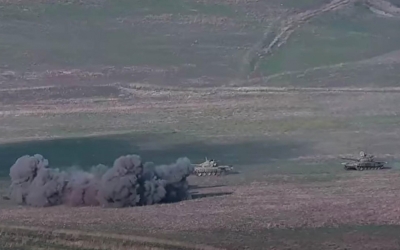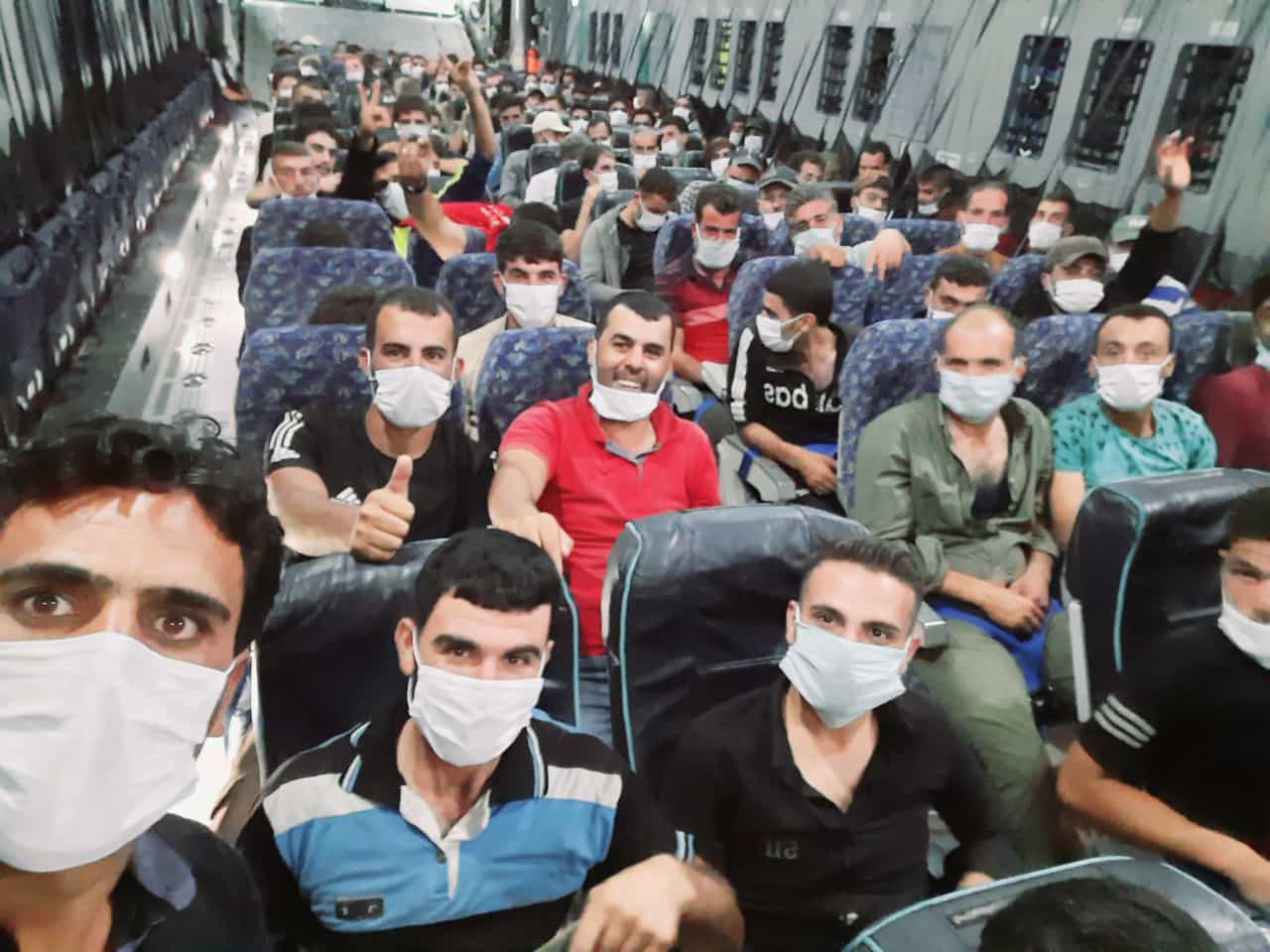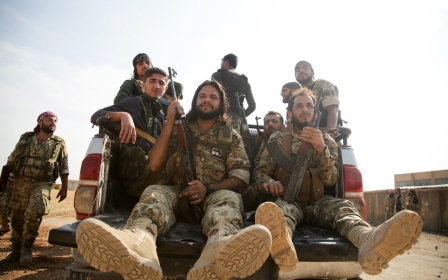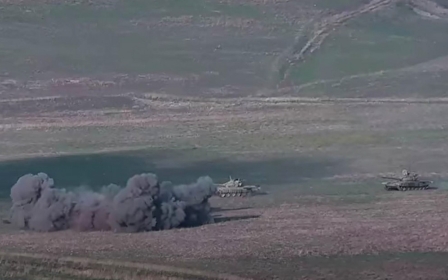Turkey recruiting Syrians to guard troops and facilities in Azerbaijan
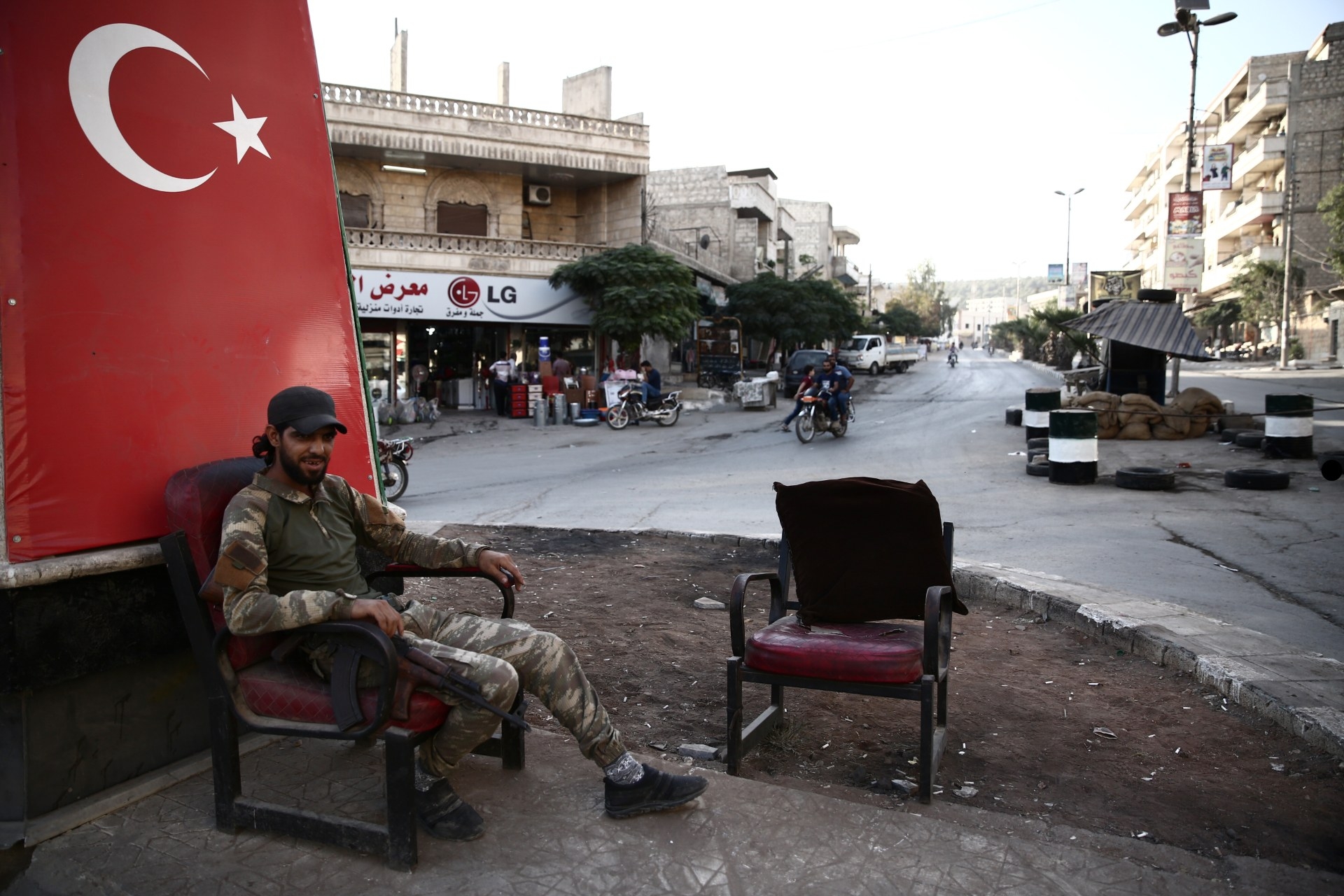
Hundreds of Syrian rebels and civilians are being sent by Turkey to Azerbaijan to guard Turkish troops and strategic assets, with suspicions that they may soon find themselves in the current Nagorno-Karabakh clashes, Middle East Eye has learnt.
A source based in Turkey with direct knowledge said that private contractors have been hiring Syrians for work in Azerbaijan since last month. All of the sources contacted by MEE spoke on condition of anonymity due to the sensitivity of the subject.
“They have gathered individuals, some civilians and former fighters, to train them as security guards with a monthly payment of $600. The first group who completed its training has been already dispatched,” the source said. A Syrian activist in Idlib province confirmed that, saying the first batch contained 300 fighters and two more groups were ready to be deployed.
'They have gathered individuals, some civilians and former fighters, to train them as security guards with a monthly payment of $600. The first group who completed its training has been already dispatched'
- Turkish-based source
Rebels are mainly exiting through the Kilis border crossing, where Turkey has established a military base in the Aleppo countryside. From there, the fighters enter Turkish territory, where they sign contracts with private security companies.
According to the Turkey-based source, Ankara can absolve itself from legal repercussions by employing Syrians via private contractors, as the government can only deploy troops with parliamentary authorisation.
New MEE newsletter: Jerusalem Dispatch
Sign up to get the latest insights and analysis on Israel-Palestine, alongside Turkey Unpacked and other MEE newsletters
“I don’t think they will be deployed to the front because there are civilians among them who didn’t get combat training. They only got the training for security guard. They have been sent to Azerbaijan well before the latest tensions,” the source said.
However, sources in Syria said rebels were signing up with the full expectation to fight.
Heavy fighting broke out between Azerbaijan and Armenian forces in Nagorno-Karabakh, a disputed mountainous area, on Sunday and clashes are ongoing. Scores have been killed on both sides.
The salaries offered Syrians are disputed, but sources in Syria told MEE that rebels were told they could earn between $1,000-$2,000 a month. Broken by a string of losses over the nine-year war, many Syrian opposition groups are able to pay their fighters less than $100.
A third battlefront
The Nagorno-Karabakh conflict has become the third battlefront where Turkey and Russia have found themselves in an antagonistic relationship, after Syria and Libya.
Turkey is a fierce backer of Azerbaijan, the Syrian opposition and the Tripoli-based Government of National Accord. Meanwhile, Russia supports Armenia, the Syrian government and Libyan warlord Khalifa Haftar.
As in Libya, where Syrian rebels and pro-government militiamen have been sent by Turkey and Russia, respectively, to prop up their allies, there is speculation Syrians could too find themselves on either side of Nagorno-Karabakh conflict.
Rumours are circulating online that Syrian-Armenian fighters allied to President Bashar al-Assad have travelled to Armenia to join the fighting.
Those rumours have only fuelled the controversy in Syria’s opposition-held Idlib province, where civil society activists have decried the export of rebels as an abandonment of their revolution against Assad.
The Turkey-based source said Ankara has grown to favour using Syrians abroad as they have developed a close working relationship with Turkish officers in Idlib and Libya. “They know how to work together in that sense,” the source said.
Turkey and Azerbaijan’s militaries recently conducted a joint military drill in August, where Turkish officers shared the experience and expertise they have developed in recent years in the Syrian and Libya conflicts.
Some in Ankara speculated that Turkey left some of its military staff there to continue to bolster Azerbaijan’s military.
Denials and protests
“These Syrians are independently cultivated from the Syrian rebel groups and they don’t belong to the Syrian National Army [SNA],” the Turkey-based source said, referring to the Ankara-backed rebel umbrella group.
“It is different from the Libya front.”
An SNA fighter told MEE that his friends in the Sultan Muhammad al-Fatih Division and Mutasim Brigade had already arrived in Azerbaijan.
Rebels belonging to the Levant Front, al-Majd Brigade, the Sultan Osman Brigade, the Sultan Suleiman Shah Division, the Hamza Division, the Sultan Murad Division, Faylaq al-Sham, the Sultan Ertugrul Division, Samarkand Brigade, the 51st Division and the Coastal Division have also sent some of its fighters to Azerbaijan, sources told MEE.
Azerbaijani and SNA officials have denied Syrians have been deployed to fight Armenia.
“Rumours of militants from Syria allegedly being redeployed to Azerbaijan is another provocation by the Armenian side and complete nonsense,” said Khikmet Gadzhiev, an aide to Azerbaijan’s President Ilham Aliyev.
Similarly, Major Yusuf al-Hammoud, spokesman for the SNA, denied to MEE that the fighters had gone to Azerbaijan and said that all news related to the subject circulating on the media is completely rejected.
A spokesperson for the Suqour al-Sham Brigades group based in Idlib said it had not sent its fighters to Azerbaijan, and videos circulated by activists showed a leader from the group advising rebels not to go to the Caucuses country or Libya.
"Don't leave the fronts, there are women, detainees and vulnerable civilians, to whom do you leave?" said the leader, bleeding from wounds sustained during a clash with government forces on the southern fronts of Idlib province.
In a separate audio recording, another rebel leader warned his fighters that finances meant he could not stop anyone going to Azerbaijan, but said they should not fight on behalf of Shia Azeris.
“These situations are dangerous and this is not our battle, the Shia have been our number one enemy supporting the Syrian regime for 10 years,” he said, adding that they will not just be used as guards and 30 Syrians have already been killed in fighting on the front.
Money and faith
Syrian activists on WhatsApp and Telegram have been circulating alleged fatwas from sheikhs forbidding them from going to Azerbaijan and leaving fighting in the Levant.
However, one audio clip also making the rounds by Muhammad Ezzedine al-Khattab, a well-known sheikh displaced from eastern Idlib, insists that going to Azerbaijan is permissible in Islamic law.
“Turkey has interests in Azerbaijan that it would like to protect, and working at this time under the banner of Turkey is permissible,” the sheikh is heard saying.
Some audio recordings are circulating of rebel commanders urging fighters to go to Azerbaijan.
"Thank God, it has been approved to send a batch of fighters to Azerbaijan from the 27th to 30th this month," said one jubilant leader.
'Just as these mercenaries are useless within our country, there is no use of them outside it'
- Syrian activist
“The batch includes 1,000 fighters, who will be divided into three fighting blocks,” the leader can be heard saying as fighters around him enthusiastically cry out about getting money.
When MEE contacted this leader based in the northern Aleppo town of Jindires, he did not deny the audio, but refused to expand on it, saying that these are private military affairs.
Despite this, he hinted about the rebels’ need for money, saying: “Give the fighters money, so they do not leave.”
In another audio clip, the purported voice of rebel leader Abu Ahmed Kaljabreen complains he is in financial difficulties and will take part of the salaries fighters from his group receive for going to Azerbaijan.
"Any fighter going out to Azerbaijan, I will take part of his salary. I'm going through a tough situation and have become overwhelmed with debts and I can no longer bear any more," the clip says.
"If your salaries are $2,000 - for me 1,000 and for you 1,000. If your salaries are $1,500 - for you 1,000 and for me 500," he adds, explaining how he will divvy up the pay.
"You can join other factions if these conditions are not right for you."
Civilians sign up
A civilian living in Idlib told MEE that he saw hundreds of rebels leaving the province. Another source said their first gathering point en route to Azerbaijan is Afrin, a Turkish-held town in Aleppo province.
Rebels are not the only Syrians attempting to travel to Azerbaijan. The civilian said one of his relatives, who has been displaced by the fighting and lives in a tent, tried to go to Afrin to sign up for Azerbaijan but was turned back at a checkpoint and told they were not recruiting anyone over 40 years old.
An Afrin-based activist told MEE civilians were attracted by the high wages, but only local residents have been recruited.
“So far, displaced civilians have not been accepted, and people of the region are prioritised,” he added.
Northern Aleppo province and Idlib are the Syrian opposition’s last redoubt, and hold more than a million Syrians displaced from all over the country.
When news broke late last year that rebels were being sent to fight Haftar in Libya, activists and civilians similarly lamented the development, particularly at a time when rebel forces have repeatedly failed to stop Syrian government offensives until Turkey and Russia come to a ceasefire agreement.
Like now, the reports were met with denials. However videos soon spread of Syrians in Libya and the names of mercenaries killed in the fighting began to spread.
Videos are already circulating purporting to show fighters with Syrian accents in Azerbaijan, and activists have shared a photo of what they claim to be rebels on a plane carrying them to Azerbaijan.
“No one will care about the killing of mercenaries, there are not even those who demand their bodies,” an Idlib-based activist told MEE.
“Just as these mercenaries are useless within our country, there is no use for them outside it.”
Middle East Eye delivers independent and unrivalled coverage and analysis of the Middle East, North Africa and beyond. To learn more about republishing this content and the associated fees, please fill out this form. More about MEE can be found here.


